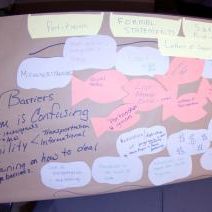
Region: North America
Language: English
Year: 2016
Source: story for the PHM website
Author(s): Lori Hanson; Baijayanta Mukhopadhyay (PHM Canada)
Summary: Members of PHM Canada had been discussing the idea of IPHUs for some time. In October 2012, at the annual Canadian Conference on Global Health a number of them committed to piloting experiences of “mini-IPHU”s” – these were to be related to local issues and the groups involved; once completed, the plan was to evaluate experiences and consider how to move toward longer, possibly regional IPHU events. The case study reports of a half-day IPHU-inspired workshop on racism and health (“an issue that is a serious concern in our health system and health policy, but one that people seldom have an organized opportunity to discuss”). Conceived by a small group of people from various community organizations, together with faculty, students and staff working on global health issues, the team used a highly participatory methodology to practice community organizing and mobilizing strategies that go “Beyond Facebook” (these were “sea of change" strategies, a highly participatory and very visual methodology designed to walk participants through steps of setting up a campaign where they want to have impact: target audiences are named, realistic goals are set, strategies are devised and so forth, all pertaining to a do-able and achievable campaign). The strategy was intended to move people beyond individual social media organizing to group oriented strategies and campaigns. Efforts towards movement building: awareness raising and sharing of experiences regarding racism in the health system and health policy; transferable skill building that could be used by participants to further explore this theme, or to be utilized in their own work in various settings. Limitations: participant evaluations noted that it was too short; need for organizational/movement actors in planning and a more coherent plan for follow up.
For more information on this experience, please write to Lori Hanson at [email protected].
Key practices: popular education, creative and interactive training, transferable skill-building
Read the full report here

